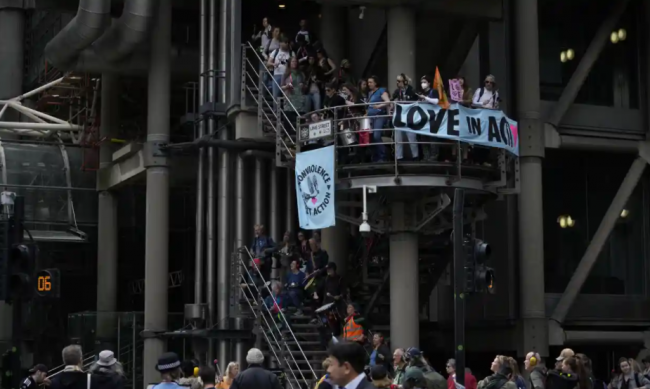Articles Menu

Apr. 12, 2022
Anti-fossil fuel activists have vowed to continue blockading oil terminals until they are jailed, as they approached 1,000 arrests for their actions so far.
“Ministers have a choice: they can arrest and imprison Just Stop Oil supporters or agree to no new oil and gas,” Just Stop Oil said on Tuesday morning. “While Just Stop Oil supporters have their liberty the disruption will continue.”
Fuel-blockade activists were taking their first day off in 12 days on Tuesday, after beginning their campaign on 1 April. “We decided to give them a break,” a campaign spokesperson said. About 400 people have been arrested a total of 900 times for taking action so far, according to the campaign.
On Monday, about 40 were arrested at Inter Terminals in Grays, Essex, some after spending more than 38 hours locked on to pipework above the loading bay. Between 15 and 20 who had helped dig tunnels under access roads to the Kingsbury oil terminal were arrested on Sunday and Monday, Just Stop Oil said.
The campaign’s statement came after the prime minister’s spokesperson condemned protesters’ “guerrilla tactics” and the home secretary complained that “people across the country [were] seeing their lives brought to a standstill”.
On Tuesday, the Department for Business, Energy and Industrial Strategy accused Labour’s Steve Reed, the shadow justice minister, of “irresponsible scaremongering” after he said “millions” could not get fuel because of the protests.

“Just Stop Oil protest activity at some oil terminals has led to short-term disruptions to fuel deliveries over the past few days. The police are working to remove protesters from sites so normal deliveries can resume,” a BEIS spokesperson said.
“We are working closely with industry to ensure that supplies are maintained. The public should continue to purchase fuel as normal.”
Disruption continued elsewhere. In London, the Lloyd’s insurance market stopped trading on Tuesday after about 60 activists from Extinction Rebellion blocked the entrances to its headquarters and stopped workers from getting inside.
“People used superglue, chains and bike locks to block over 25 entrances to the building. Staff already inside were allowed to exit. Climbers also scaled the outside of the iconic building and dropped two banners, saying ‘End Fossil Fuels Now’ and ‘Insure Climate Justice’,” XR said.
XR had called on supporters to take a week off work and join mass actions in London this week. After a weekend in which protests had blocked the West End and two bridges over the Thames, on Monday and Tuesday the plan was for “outreach” activities, with members asked to go door-to-door to talk to people about government inaction on the climate crisis.
The outreach activities were part of the XR’s 3.5% project, which has mobilised members of local XR groups to spread the group’s message in their communities. “Since we launched in January, over 70 local groups have taken part, we’ve had nearly 4,000 conversations on the doorstep and more than 80% of those who have seen the talk have signed up to join XR,” XR said.
Some members of XR have privately said the canvassing has proven difficult, with thousands of flyers handed out in some areas of the country to get just a few dozen to in-person meetings. But others say such activities had helped to achieve a better than expected mobilisation for the weekend’s protest actions.
Mass actions were to resume on Wednesday, according to a timetable circulated by XR, with supporters asked to gather from 10am in Hyde Park.
Meanwhile, more than 80 scientists, signed a letter to Greg Hands, the energy minister, saying they support the call made by a hunger striker for a climate change briefing for all MPs from Sir Patrick Vallance, the government’s chief scientist.
As Angus Rose began his 30th day without food, the scientists, including Sir David King, the former chief scientific adviser, Prof Julia Steinberger, an author on the Intergovernmental Panel on Climate Change, and Prof Susan Michie, a member of the government’s Sage advisory body, said they “unanimously support” the idea of the briefing – even if they did not all agreed with Rose’s methods.
“The crisis is evolving at a rapid pace, and it is increasingly difficult for politicians to understand the significance of the latest science that they do not have time to read and digest,” the letter states.
[Top photo: Extinction Rebellion protesters play drums outside Lloyd’s of London as they blocked the entrances to its headquarters. Photograph: Matt Dunham/AP]